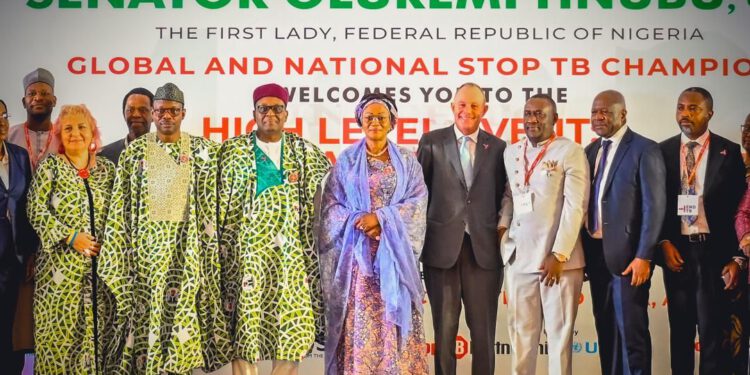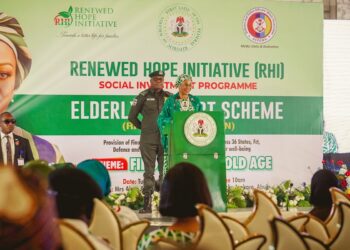First Lady of Nigeria, Senator Oluremi Tinubu, has recommitted to leading advocacy against tuberculosis, saying she is still pained that she lost one of her trusted staff to the cold hands of death because he wouldn’t disclose that he was suffering from the disease due to fear of stigmatization.
She made the recommitment at the High-Level Event: Political Leadership to End TB during the 38th Board Meeting of the Stop TB Partnership, while addressing representatives from over 62 countries present at the event, stressing the urgency of eradicating the disease.
Speaking candidly, she stated that ignorance and fear, especially on the part of the ordinary man, remain a major setback. “Most of us don’t even know we still have TB,” she said.
She expressed regret over not being part of the health committee during her 12 years in the Senate, so she could do more in the sector. Reflecting on a painful experience involving a trusted staff member who concealed his health status due to fear of stigma, she said: “I could have helped him get treatment, but he kept it from me,” she lamented.
Stressing the urgency of eradicating TB, which she referred to as “the world’s deadliest infectious disease,” Senator Oluremi Tinubu highlighted persistent challenges, including funding shortages and low awareness. She appealed for collective action to ensure no Nigerian is left behind in the fight against TB and HIV.
“Therefore, at this crucial Board meeting, I urge us to recommit ourselves to collective action, for TB remains the world’s deadliest infectious disease. And as citizens of the world, of Africa, and of Nigeria, we have the power, the responsibility, and the duty to act now. As we move forward, let us acknowledge that the data on tuberculosis are not just numbers; they represent real people, their struggles, and the profound impact of this disease. While the statistics are disturbing, it should also propel our hope, commitment, and determination to eradicate this global health crisis,” she said.
The First Lady thanked the Coordinating Minister of Health and Social Welfare for fostering respectful collaboration between her office and the ministry.
The First Lady pointed out that Nigeria is among the countries most affected by TB, with approximately 467,000 cases reported in 2023.
She recalled that during the days HIV/AIDS was prevalent, the public was thoroughly enlightened and called for collective action to address this public health crisis and protect future generations.
“Our children are most vulnerable because we are not talking about this issue enough,” she warned.
Senator Oluremi Tinubu concluded with a call to action for all stakeholders to intensify efforts in combating TB and HIV. “We have a lot to do,” she stated.
Meanwhile, health leaders at the 38th Stop TB Partnership Board Meeting in Abuja praised Nigeria for achieving an 80% detection and treatment rate for tuberculosis but warned that more resources and commitment are needed to eradicate the disease.
The Executive Director of the Global Stop TB Partnership, Dr. Lucica Ditiu, hailed Nigeria’s progress, calling it an example for other nations. She credited good leadership, particularly that of the First Lady, for driving health initiatives.
“The battle is not over,” she said, urging Nigeria to mobilize more resources and provide counterpart funding to the $25 million, mainly from the private sector, to address drug-resistant TB, stigma, and funding gaps.
Coordinating Minister for Health and Social Welfare, Prof. Ali Pate, echoed the sentiment. “Leadership is not a noun, it’s a verb,” he said, commending President Bola Ahmed Tinubu and the First Lady. He noted that the Renewed Hope Initiative’s ₦1 billion donation, released within 24 hours after her commitment a year ago, strengthened outreach programs and surveillance systems.
He emphasized the need for a united front to increase domestic funding and accountability while reiterating that Nigeria’s commitment remains unwavering. “Listening to the progress report of the country was something to be proud of,” he said.
National Coordinator, TB People Nigeria, Tope Adebola Adams, a survivor, commended the First Lady for her commitment to fighting TB.
She called for support in ensuring proper nutrition during and after treatment, as malnutrition increases the risk of death from TB, Increasing local funding for TB control and management and Training and reabsorbing individuals who lost jobs due to TB and enforcing laws to prevent stigma and discrimination.
Adams also emphasized the need for media campaigns to create awareness and encourage positive behavioral changes in TB-affected communities.
Countries such as Malawi, Indonesia, and Tajikistan shared their experiences, underscoring the importance of leadership in combating TB.





















